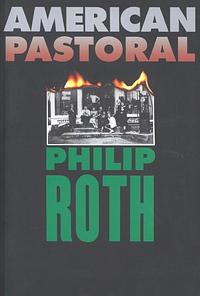You need to sign in or sign up before continuing.
Take a photo of a barcode or cover
An American novel that is great (not The Great American Novel).
It was getting better at the end, but Roth is following Dostoyevsky with this wallowing, can-you-believe-how-miserable-I-am tone. I'm not a fan, but it wasn't horrible.
Oh good lord I am done reading this book. I disliked this book so much that I would do anything other than read it: watch tv, read 2 other books, look at facebook for hours...anything! Yet, I felt compelled to read the.whole.damn.thing. Not sure why I was so stubborn on this one. There wasn't a single character that I cared the measliest bit for, not worth the agony.
It just never gets going or makes me feel anything whatsoever.
My first attempt at a Roth novel and I’m glad I took the journey.
His near obsessiveness of character analysis, and some wild tangents about glove making are incredibly detailed, and his writing is as magnificent as anything else I’ve read by Pynchon, DeLillo, or McCarthy.
There are moments of brilliance in this book, particularly when the lead character, Swede Levov, who is usually a placid individual, is internally boiling with rage.
Anyone who has been ina situation where they wished they had spoken up but they didn’t can relate to the issues that the protagonist has. At times, his emotional stunting is painful to read.
I also like the digs at humanity, all the hypocritical bullshit and lies that comes with our species. It’s such a misanthropic novel. I feel it was written for me.
The only minor issue that prevents me from awarding this great piece of literature five stars are a couple of sections that were a little long-winded and could’ve been trimmed.
I can see why Jonathan Franzen and other writers are really influenced by Roth. He is/was an incredible writer, and I’m looking forward to delving into more of his works, particularly Sabbath’s Theater, and Portnoy’s Complaint.
4.5/5
His near obsessiveness of character analysis, and some wild tangents about glove making are incredibly detailed, and his writing is as magnificent as anything else I’ve read by Pynchon, DeLillo, or McCarthy.
There are moments of brilliance in this book, particularly when the lead character, Swede Levov, who is usually a placid individual, is internally boiling with rage.
Anyone who has been ina situation where they wished they had spoken up but they didn’t can relate to the issues that the protagonist has. At times, his emotional stunting is painful to read.
I also like the digs at humanity, all the hypocritical bullshit and lies that comes with our species. It’s such a misanthropic novel. I feel it was written for me.
The only minor issue that prevents me from awarding this great piece of literature five stars are a couple of sections that were a little long-winded and could’ve been trimmed.
I can see why Jonathan Franzen and other writers are really influenced by Roth. He is/was an incredible writer, and I’m looking forward to delving into more of his works, particularly Sabbath’s Theater, and Portnoy’s Complaint.
4.5/5
With a sympathy for his characters that is anything but naive, Roth expresses the raging helplessness of what feels today like the deterioration of the north american dream and its exposure as a delusion. Reading this was a fitting way to end 2020.
At first the read seemed like a simple step into the past, a chance to relive what it was like to grow up in the 1950-60’s, a Jewish boy in the Northeast. But the narration changed as it slipped into the “Swede’s” life. What is it like to be good looking, rich, great at sports, married to a beauty queen. What’s it like to “have it made”. We think we know but really don’t. We don’t really even know ourselves let alone all those souls around us, our families, friends, coworkers. Life is complicated. It happens despite our best intent. And we adjust and cope and do our best to find our way through it all.
There was a lot in this book that resonated in me. Perhaps most importantly what it’s like to have a psychotic child. To struggle with the sense of responsibility to make things right, an impossible task. And one that continues as long as you do.
Thank you, Philip Roth, for this journey. It meant a lot to me. And thank you Ron Silver for making the story come alive with your narration.
There was a lot in this book that resonated in me. Perhaps most importantly what it’s like to have a psychotic child. To struggle with the sense of responsibility to make things right, an impossible task. And one that continues as long as you do.
Thank you, Philip Roth, for this journey. It meant a lot to me. And thank you Ron Silver for making the story come alive with your narration.
Maybe I'll keep coming off as some MTV-attention-span reader (and I do like some long books, I swear!), but I think that this book, while marvelously detailed and most excellently written, should have been at least 100 pages shorter. I found the endless descriptions of New Jersey history and the glove making industry a bit tedious. It's to Mr. Roth's credit that I read every painstaking word, because he is so good, but I wish I knew less about it all. I'm all for authenticity, and boy you get that in spades: I feel like the author lived and breathed NJ and glove making for, oh, the last 150 years.
I did find the entire first part's conceit, that some fellow schoolboy of the main character is writing a story about him, entirely without merit. I wish PR would have just written it as the Swede's story and dispensed with the set up. Seemed artificial, unnecessary, and was annoying to me. And it is rather a story of white people, which is interesting and all, but there are all these stories and I suppose they have to be written, and win Pulitzer Prizes, but it did keep occurring to me throughout the book.
In any case, it was the characters and the story that I found most compelling, and he doesn't shortchange on that (there's a lot one can cover in 423 pages). He's quite brilliant in his treatment of psychology and family history and immigrant issues and religious traditions. And white middle class Americana. It's a fabulous view into this version of America, as richly and gloriously and disastrously imagined as only an immigrant (/great writer) can.
I did find the entire first part's conceit, that some fellow schoolboy of the main character is writing a story about him, entirely without merit. I wish PR would have just written it as the Swede's story and dispensed with the set up. Seemed artificial, unnecessary, and was annoying to me. And it is rather a story of white people, which is interesting and all, but there are all these stories and I suppose they have to be written, and win Pulitzer Prizes, but it did keep occurring to me throughout the book.
In any case, it was the characters and the story that I found most compelling, and he doesn't shortchange on that (there's a lot one can cover in 423 pages). He's quite brilliant in his treatment of psychology and family history and immigrant issues and religious traditions. And white middle class Americana. It's a fabulous view into this version of America, as richly and gloriously and disastrously imagined as only an immigrant (/great writer) can.
emotional
reflective
slow-paced
Plot or Character Driven:
Character
Strong character development:
Complicated
Loveable characters:
Complicated
Diverse cast of characters:
No
Flaws of characters a main focus:
Yes
I loathed this book, and the memory of listening to it still makes me angry. Roth's biggest problem, it seems, is that he lacks all power to understand the female psyche. The book center around the relationship between a father and daughter; the daughter develops increasingly anarchist views, and her father is cast as a throwback to an old, raceless age when men were men and the world was cast in white. The sickest kernel of the text is Roth's Freudian attribution of an Electra complex to the daughter, whose moral and intellectual demise was apparently caused by her attempt as a young girl to kiss her father, who heroically, we are meant to believe, refused her sexual advances. There was nothing satirical in this book to make me think that any of my rage was attributable to Roth's master plan.




